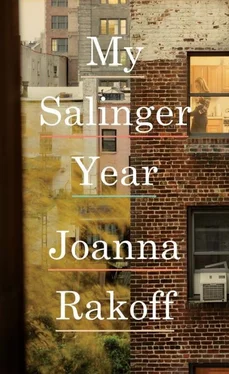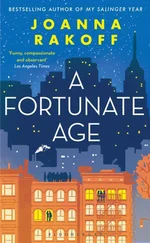It was funny, I thought, that I typed my name over and over again at the bottom of these letters. For there was a way in which the me who wrote the letters was not me at all. In the same way that the me who answered the phones, who soothed Roger’s anxieties and told producers, in plummy tones, that she was “terribly sorry but Mr. Salinger simply doesn’t allow stage or screen adaptations of his work,” was not me at all, or was a version of me. Me as an Agency Type of Person.
And then a strange realization arrived: the me who talked to Salinger—nervously, about poetry—was the actual me. Though he still didn’t know my real name.
At twelve thirty, the bookkeeper shut off his desk lamp and headed out. A few minutes later, I walked through the reception area en route to the bathroom and saw that Pam had left.
New York in August.
As I walked back to my desk, the phones suddenly began to ring. This was what happened when Pam went home. The phones rang throughout the office. I raced back to my desk and breathlessly picked up the phone. A gravelly voice shouted my boss’s name, followed by a “please.” It was as if I’d conjured him.
“Jerry,” I shouted. “This is Joanne.”
“Joanne,” he said, in a slightly softer voice. Though I had acclimated to the shouting. It no longer sounded all that loud to me. “They have you answering phones?”
“Pam had to leave early,” I explained.
“All right,” he said. “Don’t get stuck answering phones. You’ll never get out. You’re a poet.”
“My boss actually isn’t in today,” I said quickly, to stave off any nervous chatter on my part.
“She’s been out a lot lately,” he said. “Is everything all right?”
He was the first person to notice that she’d been out most of the summer.
“Yes, fine,” I said. “She’s had a lot of reading.”
“Good, good.” There was a staticky sound, as if he were rubbing his cheek on the receiver.
“Can I help you with anything?” I knew—I knew—I wasn’t supposed to help Salinger with anything.
“No, no,” he said. “Just some questions about ‘Hapworth.’ But it can wait.”
“Okay,” I said. “I’ll be here until 1:30 today if you need anything.”
“Okay, then. You take care.”
When I hung up the phone, my eyes hit the wall of his books, their titles printed so that I didn’t have to twist my head. It was almost 1:30. There was no one in the office. My phone had rung exactly once today. I got up from my desk and pulled down a paperback version of each volume. The Catcher in the Rye, Nine Stories, Franny and Zooey, Raise High the Roof Beam, Carpenters and Seymour—an Introduction . For eight months I’d stared at these titles, so much so that they were imprinted on my brain. Sometimes, when I walked along Bedford or Madison, they floated into my head unbidden, like a mantra. “ Seymour,” I’d think, “ an Introduction .” And sometimes as I fell asleep they appeared before me, floating on the insides of my eyelids in their trademark font and colors: maroon, mustard, black on turquoise or creamy white.
I grabbed my bag and slid them in, then slung it over my shoulder and walked out the door.
• • •
I thought about going to the MoMA, or the movies, or up to the Met—all things I loved to do alone and now felt obligated to do with Don—but the lines at the museums were sure to be long and the theaters were filled with summer blockbusters. I thought about calling or dropping in on a friend, but who were my friends? Where were my friends?
So instead I did what I really wanted to do, what I knew all along I’d do: I went home and read. First Franny and Zooey , because I wanted to see if I agreed with the prep school girl or not, or because I knew my father loved it, that he identified with Zooey, who was an actor, as my father had once been. Then Raise High the Roof Beam, Carpenters and Seymour—an Introduction , then Nine Stories , and then, finally, on Sunday morning, as the rain slicked down, as I drank another cup of coffee from my espresso pot, The Catcher in the Rye . I read and read and read. I did not stop for the ringing phone—Allison, who had ducked away from the wedding weekend to check on me—and only occasionally stopped to grab a peach or a piece of cheese or a glass of water. I carried the books into the bath with me—as Zooey carries his script into the bath with him—and on Monday, Labor Day, when I had eaten all the food in the apartment, I brought Catcher with me to the Mediterranean place on the corner and read it over eggs with harissa, then went straight home and finished it, with tears rolling down my face.
Salinger was not cutesy. His work was not nostalgic. These were not fairy tales about child geniuses traipsing the streets of Old New York.
Salinger was nothing like I’d thought. Nothing.
Salinger was brutal. Brutal and funny and precise. I loved him. I loved it all.
Fall

Have you read Salinger? Very likely you have. Can you recall that moment you encountered Holden Caulfield for the first time? The sharp intake of breath as you realized that this was a novel, a voice, a character, a way of telling a story, a view of the world unlike any you’d previously encountered. Maybe you were a teenager, brimming with frustration and rage, certain that no one understood the complexities of your soul, and then there was Holden, a conduit for all of that misplaced emotion. Maybe, like the boy from Winston-Salem, you thought about Holden whenever things became too much and he calmed you down, made you grin. Or maybe you, like the doomed young girl—cancerous cells multiplying in her blood as she lay on the couch and read—loved the precision, the million tiny strokes, the sparseness of Salinger’s early stories, of “A Perfect Day for Bananafish,” or “Uncle Wiggily in Connecticut,” or “Just Before the War with the Eskimos,” all of them hilarious and heartbreaking, rife with glowing, pulsing symbolism.
Or maybe you, like me, loved it all. I loved Holden, in his grief-fueled rage. I loved poor Seymour, whispering Taoist tales to his infant sister. I loved Bessie Glass, fretting about the apartment in a housecoat, her pockets laden down with tools. I loved Esmé, of course. Who doesn’t? And I especially loved—or was a little in love with—Buddy Glass, second son, who narrates a few of the Glass family stories and whose life is increasingly consumed by grief.
But I suppose I loved Franny—and “Franny”—best of all. Do you recall this story? Do you remember its perfection? Its compression? Let me remind you: In Princeton, a handsome fellow named Lane Coutell stands on a train platform, waiting for his girl—Franny, of course—to arrive for a game weekend. In his pocket, he holds a letter she sent earlier in the week, which he’s read so often he’s practically memorized it, and as she steps off the train, he’s overwhelmed by a wave of emotion that can’t quite exactly be described as love—he’s too limited a person to truly feel love, at least at twenty-one—but is perhaps a mixture of affection and ownership, with some pride mixed in; pride, of course, at having landed a girl as beautiful and brilliant and original as Franny. And yet when she asks, “Did you get my letter?” he pretends at nonchalance. “Which letter?” He is very, very young.
That letter, written in dithering girlspeak, espouses nothing but love for Lane, so much so that any reader—except Lane—would suspect the lady doth protest too much. And indeed once Franny and Lane are seated at lunch, Franny cannot—absolutely cannot—stick with Lane’s program. She can’t pretend she cares about Lane’s paper on Flaubert. Though she doesn’t express it this way, the world strikes her as filled with phonies—with egos, to use her term—and she can no longer go along with the enterprise of pretending this isn’t so, of pretending that her professors are geniuses, that anyone who publishes in a small magazine is a poet, that bad actors are good. She can, in short, no longer participate in the world, with its web of socially constructed lies. She’s dropped out of the play in which she’s been cast as the lead. She’s stopped doing her reading for class. She’s done . Done with everything except the little book she’s been obsessively reading, The Way of a Pilgrim , in which a humble Russian peasant wanders the land trying to figure out how to pray. His answer—which Franny has adopted for herself—is the Jesus Prayer, a simple mantra, which she repeats over and over, trying to synchronize it with her heartbeat, as per the pilgrim’s instructions. If you have read the story, then you know: This is not a story about Christianity. Franny’s adoption of the Jesus Prayer has less to do with Jesus than with her desire to transcend her own troublesome ego, to stop the superficial thoughts and desires that plague her. To somehow find a way to live in a world that sickens her. To be her authentic self. To not be the person the world is telling her to be, the girl who must bury her intelligence in her letters to Lane, who must compromise herself in order to live.
Читать дальше













